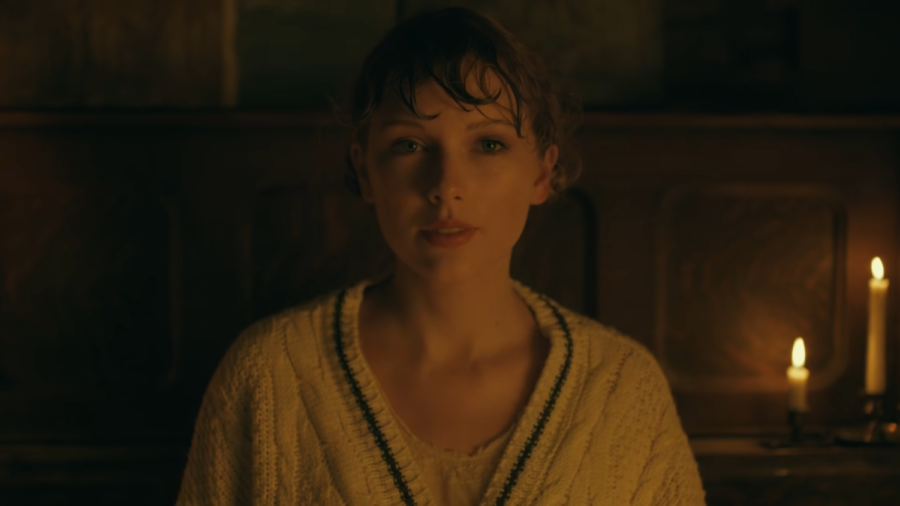Taylor Swift’s ‘Evermore’ is an example of a perfect album
December 17, 2020
Although Taylor Swift fans are still processing the release of her eighth studio album, “Folklore,” Swift recently held another surprise release for her ninth studio album, “Evermore.” This is her first-ever sister album, which continues many of the same themes from the previous album: fantasy, complex desire and stories that aren’t her own.
“Willow”
“Willow” is the opening single of the album and immediately launches the listener into a fantasy land with the plucked strings, gentle vocal falls and almost nonsensical lyrics. Swift is known for her vivid songwriting abilities, and she clearly spent extra time on the track in order to fully engulf her audience. This also features an airy, head voice from Swift. While she has been known to use her head voice occasionally, it is a bold choice to start the album in that manner. Her head voice is very nice and calming, but it is not her strongest feature. The goal of singles is to appeal to a wide audience and convince people to buy the album, so it is odd that she chose these techniques. However, they have worked well in her favor and the song is on its way to becoming a cult favorite.
“Champagne Problems”
If the first track of an album is to get a listener’s attention, the second track’s job is to keep it. “Champagne Problems” is an odd choice for the second slot because while it’s slow, it is heart wrenching and beautifully painful to listen to. It follows the story of a rejected proposal and all of the intertwining components of the aftermath. Fans have famously declared “All Too Well” as Swift’s ultimate heartbreak song, but “Champagne Problems” has usurped that title. Between covering a more mature topic that is relevant to her aging fanbase and the subtly perfect lyricism, “Champagne Problems” is devastating and leaves listeners reeling in thought and secondhand heartbreak long after the last note. This is by far the best song on the album and arguably in her entire discography.
“Gold Rush”
“Gold Rush” is more difficult to review. As previously mentioned, Swift’s strongest talent is her songwriting and lyricism. There is nothing wrong with tasteful repetition; however, “Gold Rush” only has six lines that aren’t repeated. This is disappointing compared with the rest of the track. The instrumental tracking of this song changes with every section and shifts the mood in a way that is intoxicating. It feels like a let down that so much work was put into the instrumentation and the lyrics feel quick and easy.
“‘Tis The Damn Season”
This song takes the award for the most misleading title. Combined with the December release, a bright, holiday tune was expected. Instead, Swift delivered a song about someone hooking up with an ex when she returns for the holidays. It leaves the audience longing to have someone to hold in the cold, wintery months. The line that speaks of the character returning home after the holidays as she has “to leave the warmest bed I’ve ever known” is something that resonates with everybody who has been alone over the holidays and is a punch to the gut. It’s not exactly “Jingle Bells,” but it’ll do.
“Tolerate It”
While “Champagne Problems” is the best song on the album, “Tolerate It” is the saddest. The melancholy piano aids Swift’s croon about unrequited love. The hurt and anger in her voice leave the listener ugly-crying through an entire box of tissues. Many people have insecurities and have lacked confidence in their relationships at one point or another, and this song draws out all of those emotions again. This is the blessing and curse of a Taylor Swift ballad; one has no choice but to feel.
“No Body, No Crime”
Country singers have been writing songs about killing their spouses for decades — for example, “Goodbye Earl” by the Dixie Chicks, “Gunpowder and Lead” by Miranda Lambert and “Two Black Cadillacs” by Carrie Underwood. No one knew we needed one from Swift. Fortunately, Swift delivered without being asked. The plot of “No Body, No Crime” takes unexpected turns as it shares the bond of sisterhood above men and the lengths friends will go through for each other.
“Happiness”
“Happiness” is a very simple song that is all about validating emotions and accepting changes in life. The ethereal vocals and simple background is calming and allows the audience to process the message and theme within the song. This is a prime example of the difference between Swift and other popular artists. This song is not a dancing song; it will never be played in a club or a New Year’s Eve party. However, the thoughts expressed in this song are important and need a simple arrangement to be truly heard and acknowledged. It’s not a fun song to listen to, but it makes one feel acceptance and peace.
“Dorthea”
Plain and straightforward, “Dorthea” is a bop. It’s not a happy song, but it is nice to listen to. The lift on the pitch at the end of the name “Dorthea” gives the song a playful and enjoyable feel. It can be forgettable amidst the other amazing songs within the album, and this can be viewed as an unpopular stance, but “Dorthea” deserves a spot on road trip playlists with the windows rolled down so the wind can fly through hair. This song is reminiscent of older times when two people were in love, and it perfectly encapsulates all of those complicated feelings into a simple vehicle.
“Coney Island”
“Coney Island” is a song about lost love and contains the ideal amount of melancholy, but the most interesting part of this song is the lyrical “Easter eggs.” Within the bridge of the song, Swift alludes to at least four of her previous significant others. It’s possible that as Swift is rerecording her first six albums, she is reliving all of the emotions associated with those songs. “Coney Island” could be the result of her looking back at her life and letting those feelings out. Swift is not successful because of her voice or musical talents but her songwriting capabilities and her expert lyricism, and that is further displayed by this song.
“Ivy”
The music in “Ivy” seems bright and cheerful while the lyrics paint a more complicated story of infidelity and desire. The lines “grieving for the living” and “my pain fits in the palm of your freezing hand” portray intricate emotions of someone who wants to remain faithful yet know she is going to fail. Since many of Swift’s songs are from the perspective of the person who was cheated on (see “No Body, No Crime”), it is interesting to see how she approaches the reverse with understanding instead of blame or criticism. This song is similar to “Dorthea” in the sense that on the surface, the songs are enjoyable to listen to yet are more than just skin deep upon more attentive listening.
“Cowboy Like Me”
It’s a bold choice starting a song called “Cowboy Like Me” with lyrics about a tennis court, but Swift manages to make it sound like tennis courts and fancy cars are the norms among the tumbleweeds of the Wild West. This song is a great example of how accompaniment can shift the feel of a song, especially as the instrumentation shifts between the verse and chorus sections. While this song is about a tantalizing relationship instead of a historical take on cattle herd workers, it invokes an atmosphere of fortitude, tenacity and an unwillingness to become dependent on another.
“Long Story Short”
While “Champagne Problems” is still claiming the top spot for this album, “Long Story Short” is a close second. With this track, it is fun to envision two people running into each other after years and trying to catch up before they have to split up at the next intersection. This frenzied interaction is most comparable to Swift’s iconic pop style and will appease any nostalgic longing for that era, yet it still meshes with the style of her current indie vibes. This bubbly and lively track is as close as “Evermore” comes to a dancing song, but it satisfies the urge. Additionally, although Swift has proven over and over that she is the queen of metaphor, the line “Long story short, it was a bad time,” is very relatable.
“Marjorie”
“Marjorie” is yet another example of how songs don’t need to be off-the-wall to be valuable. This song is a tribute from Swift to her grandmother, Marjorie Finlay. This contrasts with the song “Epiphany” off of “Folklore,” which was about her grandfather. This song isn’t the most enjoyable to listen to off of the “Evermore” album, but that wasn’t the intention of this track. This song is for Swift, and if other people just so happen to enjoy it, that’s a happy coincidence. The most stunning part of this song is near the end, where Swift used old recordings of Finlay’s voice behind the lines, “If I didn’t know better, I’d think you were singing to me now.” It’s truly awe-inspiring and an elegant nod to her grandmother.
“Closure”
“Closure” stands out very distinctly from the rest of “Evermore.” The song is very aggressive in contrast to the smooth, connected style of the majority of the album. In the lyrics, the main character is frustrated when an enemy from her past, most likely an ex, reaches out and expects there to be no animosity left between the two. The character finds this unacceptable and refuses to gloss over their history so simply. The song is written in a 5/8 time signature, which is done intentionally to make it feel off and disjointed to the listener. It is ingenious how Swift took advantage of the technical side of music to invoke that kind of response instead of relying on her lyricism. When all of the components come together, the irritation drips out of the speakers and into the room it is played in.
“Evermore”
The titular track of “Evermore” features a duet between Swift and Bon Iver. Other songs on this album have had feature artists as well, but Iver is the only artist to be prominently spotlighted on “Folklore” and “Evermore.” In “Folklore,” Iver sang the lead on “Exile.” It is interesting to note that Iver stayed in his lower range on “Exile” and his higher range on “Evermore,” while Swift countered with her higher range on “Exile” and her lower on “Evermore.” This contradiction to what would otherwise be parallel draws more attention to the song. This song tells the story of someone who is in a low mental state growing to find hope. As vaccines are being approved and distributed in an attempt to begin containing the COVID-19 pandemic, this is both the perfect song to wrap up the end of an album and the year 2020.

















